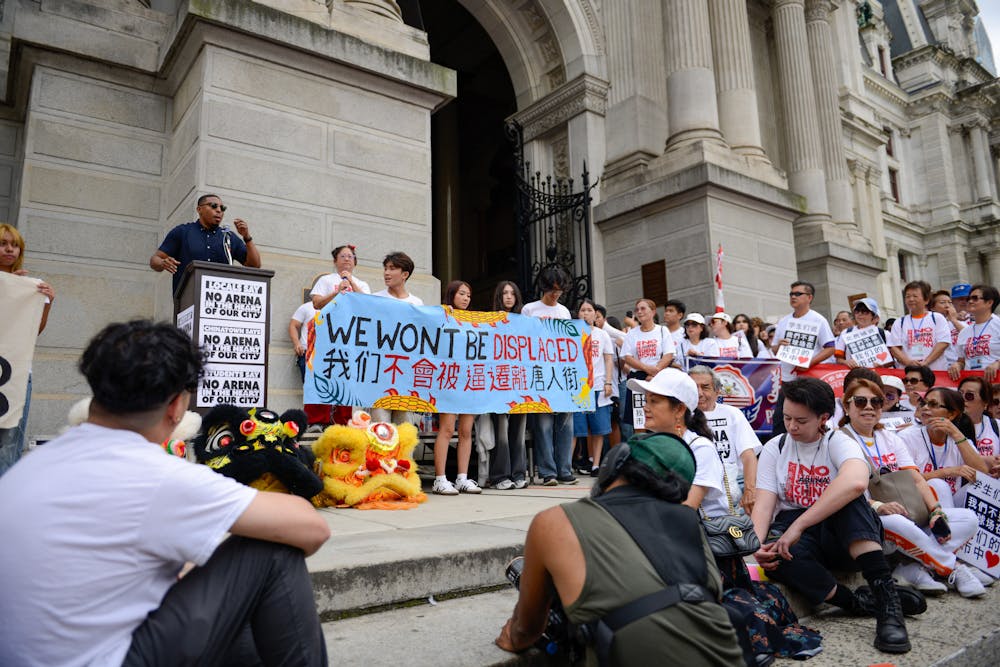
A torrential downpour did not deter protesters on Sept. 7 as they marched in opposition to a proposed Philadelphia 76ers arena in Center City.
The protest, which lasted over three hours and coincided with the first weekend of the Philadelphia City Council’s fall session, started at Philadelphia City Hall and ended at Chinatown’s Friendship Gate. The proposed $1.55 billion project — first announced in July 2022 — would be located at the site of the current Fashion District, which borders Chinatown.
The No Arena in Chinatown Solidarity Group, a branch of the Save Chinatown coalition, organized the march. Community members — including politicians, religious leaders, and students — spoke at the rally in opposition to the arena, citing concerns about gentrification. Many emphasized the need for solidarity against the arena between marginalized communities in Philadelphia.
“Our Black and Asian communities cannot and will not be put against each other while billionaires profit off of our suffering,” 2013 Engineering graduate and Pennsylvania state Rep. Rick Krajewski (D-Philadelphia) said in a speech at the protest.
The march took place following the release of city-sponsored impact studies, which were delayed over eight months from their initial December 2023 deadline. The studies — which centered on community impact, design, economic impact, and transportation — were conducted by PIDC, the City of Philadelphia's partner in economic development and intially thought to be entirely city-funded.
However, upon their release, the city shared that the 76ers had bankrolled the studies — but that they had no influence on the report.
The first of the four studies, which focused on community impact, stated that the arena would not cause direct "housing displacement," but could "cause indirect displacement through gentrification and loss of cultural identity," according to The Philadelphia Inquirer.
The studies also noted that the arena would mostly negatively impact the area's business and potentially pose a risk of Chinatown's "cultural identity" declining.
The traffic impact study reported that 40 percent of fans would need to use public transportation to travel to the arena to avoid intense gridlock in the Chinatown area and offered strategies to discourage fans from driving.
The economic study reported that the initial tax revenue estimates for the arena were not necessarily accurate and that it would produce less revenue than originally proposed, create fewer than 1,000 full-time city jobs, and bring new events to the community.
Finally, the design study called the proposed arena "appropriate for Center City Philadelphia, assuming it is done well," and added that "downtown arenas are often 'disruptive in a positive way.'"
76 Devcorp, the company leading the development of a new home for the Philadelphia 76ers, is in part led by Campus Apartments CEO David Adelman — a member of the Penn Medicine Board of Trustees. Other members of the leadership team, Josh Harris and David Blitzer, also have ties to Penn.
Students for the Preservation of Chinatown, a coalition of college students in opposition to the arena, has called for Penn to cut all ties with Adelman.
College senior and SPOC co-founder Taryn Flaherty said that the studies clearly show that "the developers don't have the city's best interest at heart, much less any thoughtful consideration for Chinatown residents and businesses."
Flaherty is a Philadelphia native who has been on the front lines of Chinatown protests since she was five. In kindergarten, she protested with her mother against the construction of a casino in Chinatown.
“When I was younger, I learned a lot from attending protests, specifically how people from many different communities spoke up for themselves and their loved ones,” Flaherty said. “I hope that this protest can serve as a learning experience for youth to feel empowered to make themselves heard.”
Other speakers at the rally, including members of the LGBTQ, Native American, and student communities, followed the theme of solidarity — specifically, protesting wealthy developers.
“Our fates are intertwined, so I got one question for you: ‘Are you with the millionaires, are you with Philly?”’ 2006 College of Liberal and Professional Studies and Pennsylvania state Rep. Chris Rabb (D-Philadelphia) said at the rally.
“Our youth do not need the city government to be at the whims of billionaire arena developers,” Flaherty wrote in a statement to the DP. “We need them to prioritize the needs of those who live and go to school here.”
Fels Institute of Government graduate and Philadelphia Mayor Cherelle Parker has not taken a firm public stance on the proposed arena.
According to a press release from the Save Chinatown Coalition, a majority of Philadelphians oppose the construction of the proposed arena.
“We will be there representing the 69% of Philadelphians who oppose this arena,” Asian Americans United Executive Director Vivian Chang wrote in the press release. “It’s time for Mayor Parker to shut it down.”
The Daily Pennsylvanian is an independent, student-run newspaper. Please consider making a donation to support the coverage that shapes the University. Your generosity ensures a future of strong journalism at Penn.
Donate







